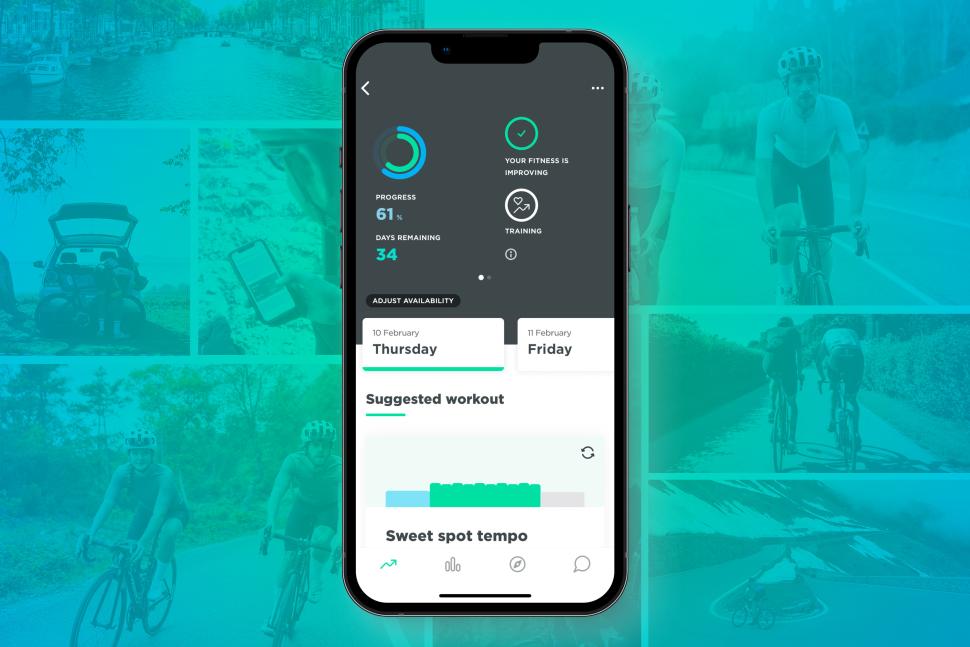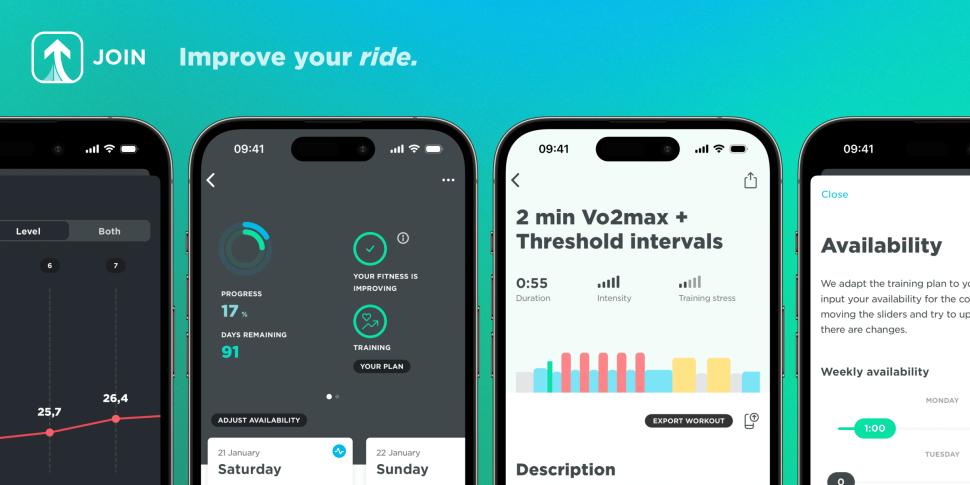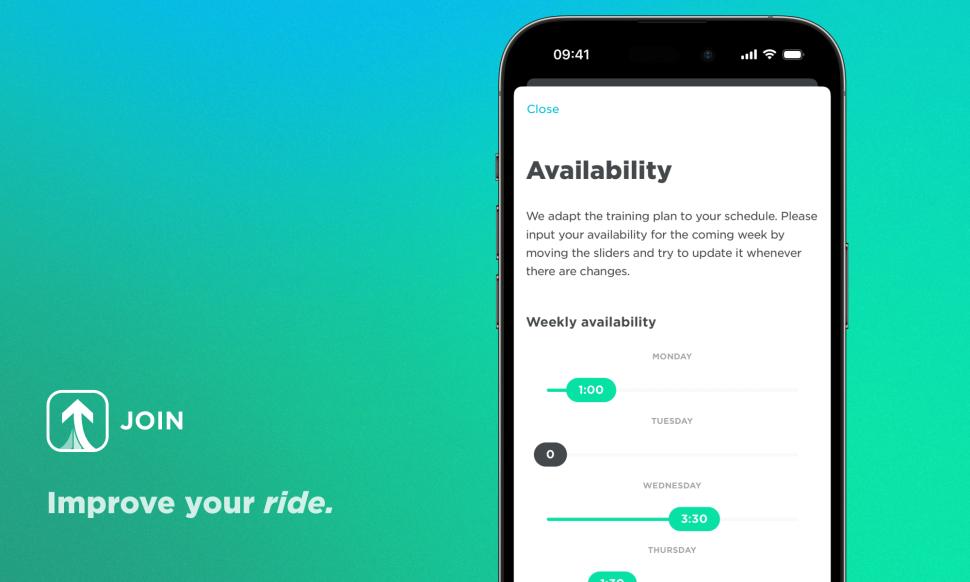- News
- Reviews
- Bikes
- Components
- Bar tape & grips
- Bottom brackets
- Brake & gear cables
- Brake & STI levers
- Brake pads & spares
- Brakes
- Cassettes & freewheels
- Chains
- Chainsets & chainrings
- Derailleurs - front
- Derailleurs - rear
- Forks
- Gear levers & shifters
- Groupsets
- Handlebars & extensions
- Headsets
- Hubs
- Inner tubes
- Pedals
- Quick releases & skewers
- Saddles
- Seatposts
- Stems
- Wheels
- Tyres
- Tubeless valves
- Accessories
- Accessories - misc
- Computer mounts
- Bags
- Bar ends
- Bike bags & cases
- Bottle cages
- Bottles
- Cameras
- Car racks
- Child seats
- Computers
- Glasses
- GPS units
- Helmets
- Lights - front
- Lights - rear
- Lights - sets
- Locks
- Mirrors
- Mudguards
- Racks
- Pumps & CO2 inflators
- Puncture kits
- Reflectives
- Smart watches
- Stands and racks
- Trailers
- Clothing
- Health, fitness and nutrition
- Tools and workshop
- Miscellaneous
- Buyers Guides
- Features
- Forum
- Recommends
- Podcast
 JoinCC-1
JoinCC-1Find out everything you need to know about JOIN, the new smart training app for real world cyclists
This article includes paid promotion on behalf of JOIN
The road to cycling ruin is paved with good intentions, not least among riders who were absolutely, definitely, completely dedicated to a training plan only to see their dreams wash away as real life intervened. For World Tour-level coach – and former Continental racer – Jim van den Berg, it’s a challenge that he knows can plague cyclists at all levels.
After studying human movement science and then gaining a degree in sports psychology, Jim started his own cycle coaching business. But one thing he began to recognise was that life, fun and training are all necessary ingredients for successful long-term cycling. To that end, Jim created JOIN, an app specifically designed to provide dynamic and flexible training plans based on each user’s goal, availability and training history.
First released in Jim’s native Netherlands and Belgium, JOIN has already racked up 3,000 reviews in the App Store and is now expanding into the rest of the world.
We caught up with Jim to find out how JOIN differs from other training tools, and how his personal experience of coaching riders at the very highest level has informed the JOIN philosophy.
road.cc: Tell us all about JOIN.
Jim van den Berg: JOIN is a platform that provides cyclists with flexible, adaptive training plans. So JOIN is a training plan on one level, although we actually prefer to talk about JOIN as a training ‘tool’.
‘Training plan’ feels rigid. Everybody recognises the situation where you print out a training plan and in the second or the third week you have already missed a session and you’re a bit lost about what to do next. Those plans only ever seem to work for pro riders who have a lot of time on their hands; for normal people those plans aren’t always helpful.
What we make is a plan that adapts to what you do and also the time that you have available. When something changes – perhaps you decide to ride a little longer because you are out with friends and the weather was nice; or perhaps you miss a ride – then your JOIN plan will adapt accordingly.
So how is JOIN different from other training apps?
Our biggest advantage is the way that JOIN members can combine doing a group ride or base miles or even doing a Zwift race, with doing structured workouts.
I used to compete at semi-pro level for quite a while, and I still personally train a couple of pro cyclists: Taco van der Hoorn of Intermarché and former Dutch champion Pascal Eenkhoorn of Lotto. Amateur riders often feel that pro cyclists only do structured workouts every day from minute-to-minute. That’s just not true. There are a lot of base miles, group rides, mountain bike rides and a whole combination of things. Of course there may be two or three key structured workouts that a pro cyclist needs to do each week, but it’s not constant structured workouts.
So that’s the philosophy that JOIN is trying to bring to amateur cyclists. It’s important that once a week you try to do high-intensity intervals. But that doesn’t mean you have to do all your workouts in solitude, exactly at the right time, exactly at the prescribed power output. There should be fun to your training session, so if you decide to swap structured workouts for fun, JOIN can take that into account.
Tell us about one aspect of JOIN’s philosophy, that consistency is more important than intensity or volume.
The truth is that real progress comes from consistency in training, riding your bike 12 months a year. Then you can see month-to-month and year-to-year progress – that’s what really counts.
If you look at a typical training plan, there are only three factors you can adjust: frequency – how often you train; volume – how many hours you put in; and intensity. What we often see is that amateur cyclists try to dial those three factors in, trying to find a perfect combination for every day, and every week, and every month. But life doesn’t work like that.
You need to identify the most important thing first, which is to be on your bike as frequently as possible, according to your level and ability. If you’re currently only riding your bike twice a week, then we wouldn’t suggest you should immediately start riding it five times a week. It’s more important to get a routine and a rhythm instead of losing yourself completely in the finer details of a training plan and maybe even missing out on the fun of cycling.
How has JOIN’s approach been informed by your own experience?
As a cyclist myself, I know that doing a structured workout can be really rewarding, it doesn’t have to be seen as just a burden. But not every workout should be like that, there has to be a balance.
That’s even true for pro cyclists. I train the pro cyclists that I work with on the basis that they are going to have a long career, not that they are going to burn out after one or two years. What I’m trying to do with them is ensure they’re still racing their bikes when they are 35 – that’s my actual goal, alongside seasonal goals.
Of course, not every workout is only fun, but if there isn’t any fun, then I’m pretty sure there won’t be a long career there.
That’s so interesting: we always think of professional coaches looking towards goals a year or two away – or maybe four years away in an Olympic cycle – but not 10 or 15 years away. Why do you do that?
It’s partly because of my own cycling career. Although I never made it to become a full pro, I did have a lot of fun being at Continental, semi-pro level. But I combined my own cycling career with coaching actual pro riders, so I understood what they were going through and the importance of fun and maintaining intrinsic motivation. Otherwise, you just won’t be able to keep up.
Here in the Netherlands we have people like Laurens ten Dam, who is still a pro, who is still making the most of his cycling and who is still having a lot of fun. He has made things work for him and that is pretty inspiring. And there is a movement even among pro cycling coaches at the moment that is asking, are we doing the right things? Are we on the right track to help riders really make the most of their careers over the long term.
That’s where JOIN can come in. We often see people look at pro cycling as something they need to replicate at the amateur level as well. It’s the Instagram problem: if people only see their heroes doing structured training and they don’t see that 80% of those heroes’ training plans consists of riding their bike with friends or doing base miles or mountain biking or cyclo-cross, then amateur cyclists think they also have to do structured workouts and they burn themselves out.
For somebody new to it, how does JOIN work?
We take some of the rules we apply to pro riders but centre them around a typical rider’s availability. So, instead of a rider going to a coach and saying they want to ride La Marmotte – and the coach saying, ok, you need to train 12 hours a week – with JOIN you say how much time you have available, what your goal is, and JOIN will help you to show up in the best shape possible.
If you are using JOIN for the first time, the app will ask you to set your availability. You can change that on a daily basis and your schedule will adjust to fit. If you miss a workout on one day, it has an impact and you might have an extra workout included later in the week.
Then you set a goal. And you’re good to go.
But what I think is really neat is that we have a list of events within the JOIN application and we have a system that we call JOIN Levels. Your JOIN Level essentially says how good you are. We don’t use that to set out leader boards, but it allows us to say to people, if you want to do a certain event, we recommend you have achieved a certain JOIN Level to take part. We think that it’s way better to do events that are suitable for your level and have fun rather than immediately going for the longest and hardest option available.
Finally, do JOIN users need any special kit?
No, they can train with a power meter, or heart rate, or even just by using rate of perceived exertion. Training with a power meter can bring extra detail that can help guide your training but we know that so much in cycling is complex enough, so JOIN will even give you some guidance on how to train with a power meter. You can also sync JOIN to other accounts, like Strava, Garmin, etc.
Whatever you use, JOIN will show you the estimated progress you will make based on all your training data. We can recommend workouts, events and goals. Our aim is to help cyclists to improve their entire cycling experience – not just cycle faster but cycle further, more comfortably and improve in every area that’s important to them.
What we are trying to do is make the training experience really simple and intuitive, more flexible with better adaptiveness. But behind all that it’s based on fairly complex science and the very best coaching philosophies and knowledge.
To find out more, visit join.cc




Ref the UCI fine, it was amazing just how many gels MVdP needed in the aftermath of the Pog crash...seemed to be quite a few, one at a time, and...
One bike seized? I'm sure there were four of them. ‐‐---- Quote "E-bike riders caught using police drone" Did the steal the drone, as well?
My bike was stolen from a supermarket car park in Calais, it was locked on a roof carrier....
Mirror advised.
She had demonstrably caused serious injury so that's not up for debate (or shouldn't be)....
I've tried Lakes in shops and they always seem to have a high volume, meaning a lot of space above my foot.
Yup - Rivermind! ****SPOILER ALERT***** https://www.radiotimes.com/tv/sci-fi/black-mirror-common-people-ending-e...
A friend told me that Gravaa doesn't work with inserts. Visma actually glued their tubeless tyres on to avoid tyre detachments! Sounds like a...
That was my first thought when I saw, and read it........
My understanding was traffic data also suggests that its actually made driving quicker not slower in Paris....